
Every civil rights movement seems to have at least one leader. Frederick Douglass and Martin Luther King Jr. Elizabeth Cady Stanton and Susan B. Anthony. Ron Jeremy and Jenna Jameson. So how come us homosexuals don’t have a go-to guy?
Actually, we sort of do. More often than not, it’s folks like HRC’s Joe Solmonese and GLAAD’s (since exited) Neil Giuliano who told the world what the gays’ hopes and dreams were. Fishing for a soundbite, any lazy reporter could always turn to one of these fellas, who tout huge “membership” numbers as evidence of their command. This is problematic for any number of reasons, from their black-tie-gala approach to securing our rights to their whole “part of the establishment” operations.
For a different reason, there’s a parallel here to explain why much of the black community rolls its eyes when the Rev. Al Sharpton gets on his megaphone to tell the world what people of color are thinking. “He does not speak for us,” they say. “He’s out of touch,” they note. “He’s a crazypants hypocrite,” they whisper. Much of the gay community says the same about its unelected gay rights leaders who pow wow with Obama and are charged with representing our voice to the rest of America.
The New York Times‘ Jeremy Peters takes an admirable stab at finding out why we’re without a grandstander. He fails.
How about we take this to the next level?
Our newsletter is like a refreshing cocktail (or mocktail) of LGBTQ+ entertainment and pop culture, served up with a side of eye-candy.
One explanation is that gay and lesbian activists learned early on that they could get along just fine without one. Even in the movement’s earliest days following the violent uprising at the Stonewall Inn in Greenwich Village 40 years ago this week, no singular leader emerged. Some historians believe this is in part because it was — and still is — difficult for the average American to empathize with the struggles of gay people.
That the “average American” cannot sympathize with our civil rights struggle does little to address the fact that we’re still pretty good at organizing, mobilizing, and messaging. Sure, we mastered grassroots activism before it was something the Facebook kids were engaged in, but we’re no less focused on a nationwide push than, say, women’s suffrage ever was.
Another reason for the absence of a nationally prominent gay leader is the highly local nature of the movement. Unlike the civil rights and the feminist movements, the gay movement lacked a galvanizing national issue.
Ahem: DOMA, DADT, ENDA.
That movement for equality was later overshadowed by efforts to combat AIDS in the 1980s and early 1990s. And AIDS itself is a reason leaders were hard to come by. “AIDS wiped out a whole generation,” Mr. Eisenbach said. “What you have is a vacuum. And that still has not been filled.”
But that would be like saying assassinations and lynchings were the reason the African-American civil rights movement didn’t have a leader. Except they did, despite those death sentences.
None of Peters’ arguments wholly explain why the gays never mounted an effort to put one person at the top. You could say Harvey Milk was on his way there, but who knows how far outside San Francisco he could’ve carried his message. In the meantime, we’ve allowed for Gay Inc. to dictate our agenda, at least in the eyes of the rest of the nation. Those in the know realize there’s much more happening on the ground, and the Somoneses of the world not only don’t speak for us, but barely have a seat at the table.
So the question remains: Why don’t we have a gay leader?
Or maybe the better question is: Do we even need one?

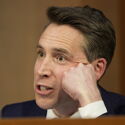

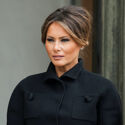



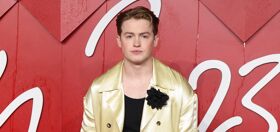
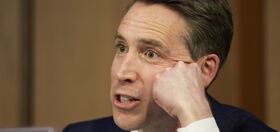
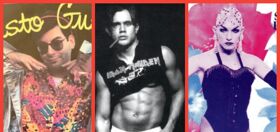

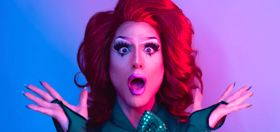
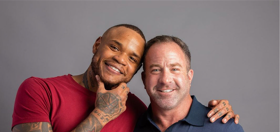

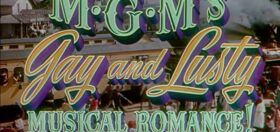
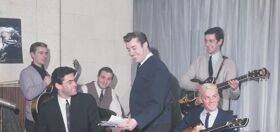


Bri
This isn’t unique to us.
Anthony in Nashville
There are many reasons why gays can’t find a “leader.”
Inability to agree on what the main goal is. Right now ENDA, Don’t Ask Don’t Tell, gay marriage, gay adoption are all competing as the “signature issue.” We can’t articulate what our goals should be, so we are disorganized.
In-fighting between people on the community. Racial problems, male/female issues, people don’t like bisexuals and transgenders, etc. We can’t get along.
Gays have a tendency to be very individualistic, so we find reasons to disagree with anyone who tries to be a leader.
Bri
Also,
So the question remains: Why don’t we have a gay leader?
Or maybe the better question is: Do we even need one?
http://www.queerty.com/friday-forum-whos-in-charge-of-the-gay-rights-movement-20090306/
JoeB
I think part of the problem is that we’re so ready to tear down and criticize those who put themselves in charge of anything. Read, oh, I don’t know… ANYTHING that has been posted on queerty for the last several months.
How did MLK become ‘in charge’ of the civil rights movement? From what I understand, it started as a grassroots effort that had very specific and focused projects in the South, and it evolved into a national movement. I suspect that there were actually several groups approaching this from different angles/different geographical areas, and MLK became the most visible, but not the singular leader.
Joey Mills
I want to be the Gay Al Sharpton!
Captain Freedom (HRC doesn't speak for me)
Dustin Lance Black (even with his nudie photos) and Ellen Degeneres are far more worthy leaders than Joe Blow-Obama Solmonese.
However, let’s also not forget Rachel Maddow! We do have leaders all over. Let’s pretend we don’t. These people have done a far better job of defending our dignity and pride than the unelected douchebags in Washington who team up with the Christianists in government.
Luke
The Gay movement hasn’t picked a specific right to fight for. We want it all in one movement. The other national movements picked one and only one thing to fight for in the government and the rest followed after many years. For that matter, if you go to the wrong places Jim Crow is still practiced in various ways.
“We” need to choose – what is the one right we need now. Is it federal legal protection, marriage, repealing DADT, or what? Winning one across the board provides a building block.
There is no cohesion to lead…how does one person step in to lead many groups?
Dabq
Yes the glbt movement needs a face to get the message out, someone who can coherently put the message out there, and, it has to be one message, not all the different ones going around now and, it has to be a face that the average person can relate to or at least empathize with on the injustices, which so far there isn’t one IMO.
SFNative
We have leaders, some more visible than others.
Cleve Jones is very visible.
Dustin Lance Black is becoming very visible
Lt. Dan Choi has become VERY visible of late with DADT.
Michael W.
If we ever do get a leader, I hope he’s young and hot. No fug mugs, no oldies and no fatties. And he better be straight-acting and not talk with a lisp.
Celia
Back in the sixties, there were people who thought Martin Luther King didn’t go far enough, that his peaceful protests were too wishy-washy. Feminism is hugely fractured, and has been since it began. The idea that the other civil rights issues had/have one glorious leader who can lead us all out of the pit of despair is a fallacy – they’re just as human and fallible as we are. Besides, the LGBT community is incredibly diverse, and to pick just one leader will shut out all the people who don’t fit that person’s qualities. Can a cisgendered man really speak for women and the genderqueer as well as his own gender? Could a white man represent those LGBT people who are not white? Of course, the reverse would apply if the leader was neither male nor white (young/old, rich/poor, city/country etc). One person cannot be the voice for everybody, so we should look to groups and ideas, rather than to individuals.
busywithpartying
Maybe because we are (mostly) a bunch of partying bitchy queens who are more concerned about getting laid than getting rights.
J.Lowrot
Martin Luther King was already being marginalized by more militant groups by the time of his assassination. Had he lived he might be regarded as a leader of the civil rights movement, but not THE leader. The civil rights movement actually is unique in the sense that it had such clearly defined leadership for an extended period of time.
Thom Freeheart
I will be the leader.
Hampton
I strongly recommend Dan Savage for the job.
If you have seen him debate people and explain his
very common-sense positions on issues, I think
he would make a fantastic leader.
Ryan Watkins
The LGBT community definitely needs a singular leader. I’ve been asking the same question for quite some time. As a straight ally, it’s been frustrating to not have an organization to follow or support that is the primary mover and shaker.
dontblamemeivotedforhillary
………..only if they are “Fearless!”
drresol
Ellen Degeneres, Harvey Milk, Signorile, Rosy O’Donnell, Andrew Sullivan, RuPaul, Savage, Solmonese, Margaret Choe, Kathy Griffin (and her mom)….
I think the gay community’s diversity allows for a broad spectrum of ‘leaders’, who are sometimes more like icons (although they could be both). Some of them are political, some are just fun, and some are both. I think that’s how our movement works best, though…we confront society from all sides and with a dozen different approaches and methods. And you can’t destroy the “gay agenda” by killing one particular person or squashing one particular stripe of the rainbow…it’s too decentralized. We’re like the liquid metal terminator.
Tim and Earl
Seems to me that “we” have had to become unconventional, non-conformist, and independent creative individuals to survive and thrive in this heterosexual-supremacist-dominated world. So these inner strengths cause us to not be too quick to give our inner power away to one other person (a so-called “leader”).
The resulting decentralization of power seems to have been a good thing in this civil-equality struggle that involves so many very diverse issues.
Luke
@Celia: While true, humans have a tendency to look for 1 person they can place their entire understanding of a group.
People don’t like different (look at bars/clubs for a quick generalization…people segregate based on tastes).
MLK Jr. May not have been what people wanted, or everything to everyone – but that’s not the point of a leader. It’s to give the general populace a place to look and understand. MLK obtained (some) understanding for the entire black population…and I’m sure they’re a diverse group as well. He provided a place for everyone to see that there’s at least one we can understand…which makes the entire group understandable.
People don’t look for the intricacies of another group – just the outward appearance; the specifics don’t matter. The stereotype is all you have to work with. MLK broke the stereotype and gave the nation someone they could feel some level of connection with – the educated saw an educated man speaking, church goers saw a preacher, the black population had one of it’s own to follow.
Many leaders is a great thing to have, but no one issue gets addressed by anyone. Too many cooks in the kitchen and dinner gets ruined.
Anthony in Nashville
I think the gay community’s efforts to discover “leadership” is also made more difficult by the extreme diversity of LGBTs.
Because we cut across all demographics, it’s almost impossible to find something on which all LGBTs agree. I used to think there was a unique gay perspective or ideas and principles that all gays shared. But as I’ve grown older, I realize that is not the case. It seems the only thing gays have in common is that they like to have sex with people of the same gender. And since people are free to have sex with whoever they want behind closed doors, what do we organize around?
This is not meant as a slam on diversity, because that’s not what I’m trying to do. I do think that our diversity makes it more important that individuals come out, because we can affect change in our “home” communities (black, upper class, women, bisexual, Asian, poor, etc etc). I’m not sure that undeniably charismatic person who can motivate across the various demographic lines is out there.
Tim and Earl
p.s. Unlike other minorities, we have not had the luxury of support most minorities get from their parents, families of origin, schools, faith groups, neighbors, acquaintences, teachers, leaders, politicians, doctors, lawyers, siblings, bank tellers, most organizations, charities, military, government, etc. ad infinitum.
So “we” needed to rely solely on our own isolated survival skills to survive and thrive.
We’re not about be in a hurry to collaborate with any so-called leader who could then do us in!
Most leading people, organizations, governments, and religions, have done us in bigtime over the centuries – they’re not trustworthy to our independent-minded tribe!
As collaborations develop in the future, this will change and a leader may emerge, but not for a long time.
dgz
@Hampton:
a sex columnist? please.
he also can’t keep his mouth shut about legalizing all illicit drugs. that’s not what we need right now.
i nominate any lesbian. the commenters on this site are making me rapidly lose faith in gay men.
Jaroslaw
Nationally, Dan Savage is well known and he is a very good speaker. His books are well written also.
However, my personal choice for being brilliant and quick on his feet in a debate, witty, intelligent AND VVGL is Sean Kosofsky, former policy director at Detroit’s own Triangle Foundation.
http://www.bilerico.com/2007/06/seannew-thumb.jpg – I do not know why none of his photos show how truly handsome he is.
robieusa
We need to distinguish the popular from the effective. Yeah, Savage is great, Degeneres is oh so cute, but we need a leader who will doggedly fight for equality; not one who is just a good time.
InExile
@Hampton: Your comment:
I strongly recommend Dan Savage for the job.
If you have seen him debate people and explain his
very common-sense positions on issues, I think
he would make a fantastic leader.
I agree, he speaks better on our issues than anyone else, hands down! He can stand up to the bigots very effectively which is what we need.
edgyguy1426
There are so many different media outlets, too. You have to have mad media skills to be able to pull it off. When there were only TV and print it was pretty easy to get yourself into the new by calling a press conference or get yourself arrested thru an act of civil disobedience. I think one of the better organizers these days of media manipulation might be Gavin Newsom. He seems to be learning how to play that game. Now if we could get someone to step up and get it together. Michael W. – I hope you were being facetious and that wasn’t your actual view.
edgyguy1426
@robieusa: True I think Degeneres was criticized for not being more vocal on the Prop 8 issue. She was too little too late.
MB
The problem with all the media personalities being mentioned is that they hold no official function. In what capacity could Ellen DeGeneres or Dan Savage attend a White House meeting? They don’t even qualify as members of the press.
Harvey Milk was an elected official. Solmonese is head of a major lobbying group. We need someone with that sort of legitimacy.
MB
^That’s supposed to be official POST, not official function, obviously. I’m mixing up French and English.
andy_d
@Luke: You ask “There is no cohesion to lead…how does one person step in to lead many groups?” They don’t. For the civil rights movement, there was the SCLC – Southern Christian Leadership Conference. As far as I am concerned, there is currently no group willing to put our rights ahead of their need/want for attention/power/money.
Oh how I miss the days of GAA (Gay Activists Alliance)! There were local chapters with a national coordinating organization.
Bill Perdue
The LGBT communities face an acute crisis or leadership. We have plenty of self-appointed, high salaried ‘leaders’ but they’re almost all instruments of the Democratic (sic) and Republican parties masquerading as GLBT activists. They’re apologists for bigotry and blind to the fact that they have zero, nada, zip power in their respective parties. Their wasted efforts to reform their parties and ride the jackass or the mastodon to victory are evidence of the kind of delusions that would get most people institutionalized.
Every four years they can be found marching down the aisle to wed (only later to divorce) the latest version of the lesser evil. Obama is, if anything, worse than Clinton. In fact, he seems to be sliding down that slippery slope to shrubhood.
Electoralism, the silly belief that elections create change, hasn’t been an important element in social progress since Lincoln’s reelection in 1864. The proven method of compelling change has been massive, militant movements that utilized mass actions, boycotts, mass education and mass organizing. Electoralism at best is just a tactic to aid those struggles. But mostly it’s a waste of time. If elections created change they’d be outlawed.
The mass action perspective won the battles of the early unions. It was used by the suffragists to get the vote. It enabled the rise of the CIO. It was the key to victory when WWII GIs went on strike in the “Bring us Home” movement to block their deployment to China and the Balkans in 1945 and 46. It helped win the civil liberties campaigns challenging McCarthyism. It, combined with the intransigence of insurgent Vietnamese, powered out victory over American militarism. It’s the tactic that forced the Supremes to decide on Roe vs. Wade. It was a vital element in the strategies of Malcolm X, King, SNCC and the Panthers, north and south.
And it’s been, off and on, a vital element in our own movements.
The LGBT communities have no national leadership. The Log Closeteers types and Stoned Democrats are misleaders – they gave us a choice between McCain and Obama and the upshot is a series of heavy defeats from ENDA to Prop 8. These defeats in turn produced a radicalization that’s expressed in dozens of significant demonstrations against Prop 8, plans to undo it, a call for a national March on Washington and the militant Dallas Principles.
We need more. We need a democratically run, nationwide, grass roots activist group combining the militancy of the Dallas Principles, independence from the right centrist bigot parties and a mass action perspective. Creating such a coalition is far and away our most important objective.
What we absolutely don’t need is a fuehrer.
Forrest
Our “community” is simply to unwieldy to have a single leader IMHO. Our one uniting factor is in the sack.
As the NYT article referenced, that fact is hard for straights to see in the same context as people being deprived from whites only water fountains and lunch counters. I am not saying the discrimination we face is not just as wrong but that’s not how the majority see us.
Nickadoo
@Michael W.: Ha! Why didn’t we think of this sooner? We’ll find our leader with a Craigslist ad! I love it!
• it’s NOT ok to contact this leader with services or other commercial interests
Dabq
Sorry, no one in the real world is going to take a kinky sex writer or whatever it is he claims to be, serious as he isn’t impartial enough and is clueless about the diversity of the glbtq community as he speaks for those who look like him.
I’ll take a Rachel Maddow as the one smart, witty and has a clue.
eagledancer4444
Hmm…I am reminded of the policy of “divide and conquer” that has historically been used by the Federal Government. For American Indians, this meant a “Chief” had to identified to sign treaties. If Native leaders weren’t willing to sign, the Army did a “field promotion” of picking someone from the crowd to be “Chief.” Many Native Nations have a variety of leadership positions, and specific ways of removing the person from “office” if he or she were unfit. When the Indian Reorganization Act was passed in the early 20th century, it required Native Nations to be restructured in a corporate board structure, where an “elected tribal council” took the place of traditional leadership. Many of those who held to the traditional forms of leadership chose not to participate in tribal elections, feeling this would be embracing an alien structure that didn’t meet the needs of the community. Over the years there have been many splits on reservations, where tribal officials are elected by a small portion of the eligible voters, and they are the only ones the Federal Government will recognize. The more grassroots people reject the leaders, but then have no voice for the outside world. I wonder if that’s what happens with the “approved leaders” are the ones chosen to represent the GLBTQ communnity to the public…
There’s a wonderful quote of Andre Lourde–
?The master’s tools will never dismantle the master’s house
Thom Freeheart
Gays need a lead who is “free of an agenda. Except that gay one.”
That leaves out Maddow and Savage and their Democratic ilk.
M Shane
There is only one serious devisive element to the gay community: unabated ignorance. if we would read and heed the fairly numerous gay thinkers who have written plenty of books, articles and interviews condemning the stupid adherance to a very few closeted right wing columnists: Andrew Sullivan, Bruce Bawer and Signorile who keep pushing the Mainstreaming garbage down our throats, and try being authenticaly gay we would be free of all the numb clater. As Rupert Everet said:
“Gay politics? What gay politics? I don’t see any gay politics. I see a few lazy, torpid, unimaginative—certainly passionless—‘organizations’ that maintain they fight for us when what they do is relatively useless.”
There are plenty of things: a world of things to make a gay platform. The gay community has gone what seems to be the easy way: the ignorant way.
schlukitz
@M Shane:
You and SM been friends long?
Perhaps you’d care to share with us what you REALLY think of the gay community?
What pile of rocks do queer-bashers like you and she live under?
James
Thank you for such a cogent response to this question. This is exactly what we need, and I would hope that any number of people who are not taking this question seriously will read and re-read your response. Thank you
James
Previous response was meant for Mr. Perdue.
WillBFair
A leader needs a mature and educated community. Ours is still carrying a ton of baggage from having grown up in homophobic society. They’ve been shooting themselves in the foot for thirty years. And they won’t look at their self destructiveness and internalized homophobia. Until they do, we won’t get a leader or even a practical strategy.
schlukitz
Drat!
I was planning on having a perfectly lovely day tomorrow.
But after that abysmal glimpse into WillBFair’s crystal ball, I think I will just go out and shoot myself in the other foot as well.
At least, they’ll be a matched set.
BigDyke
@Captain Freedom (HRC doesn’t speak for me):
You are sooo right. I vote for Maddow. But seriously, the Gay and Lesbian Community doesn’t need leaders. We never have. We are a true grass roots civil rights movement. We are diverse as hell. Too diverse for a “leader”. That being said, we have now, and have always had, amazing courageous and powerful representatives. We Rock!
BigDyke
(anyway, we do have a singular gay “leader”- Johanna Sigurdardottir, the Prime Minister of Iceland. lol.)
Steve
Why do we need a go to guy? What about a go-to gal?
hyhybt
“Why Don’t We Have a Singular Gay Leader?”
Because they got bought out by AT&T 🙂